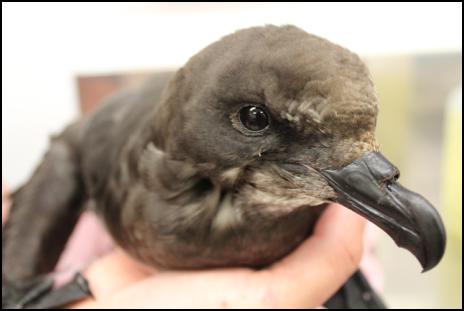Wellington Zoo treating second critically endangered Taiko

Wellington Zoo treating second critically endangered Taiko
Wellington Zoo has welcomed a critically endangered Chatham Island Taiko that was flown to the Zoo today from the Chatham Islands to be treated by the team at The Nest Te Kōhanga.
The juvenile seabird is one of the world’s rarest bird species with current population estimates ranging between 120 to 150 birds with only 17 known breeding pairs.
The birds are also known as Magenta Petrels and only breed at the Chatham Islands.
Dr Lisa Argilla and the veterinary team at The Nest Te Kōhanga will now run tests to attempt to diagnose what is wrong with the sick bird, which will likely be followed up with x-rays on Sunday.
This is only the second Taiko to be bought to mainland New Zealand – with the first also treated at The Nest Te Kōhanga and then successfully released in 2011.
It is thought Chatham Island Taiko once bred in huge numbers in the southwest of Chatham Island before the species was driven to the brink of extinction by introduced mammalian predators. They declined to the point they were considered extinct until 1978 when a small number were rediscovered by New Zealand ornithologist David Crockett.
Without continuing work by DOC and the Taiko Trust to protect the adults and young from introduced mammalian predators the species would rapidly become extinct.
Taiko nest in burrows two to five metres in length. Breeding pairs will use the same burrow each year and usually mate for life with the same partner. A single white egg is laid in November or December. Both parents share incubation of the egg which lasts 55 days. Once the chick hatches around the middle of January both parents feed the chick for approximately 105 days until it is ready to fledge.
When the chick is ready to fledge and depart out to sea, it will climb a tree in the dense forest and launch itself for the five kilometre flight to the coast and out to the South Pacific Ocean. The Taiko chicks then remain at sea for three to four years until they are ready to return to the Chatham Islands, find a mate and breed themselves.
ENDS


 Greenpeace: Greenpeace Calls On Fonterra Investors To Consider Big Picture With Giant Puzzle
Greenpeace: Greenpeace Calls On Fonterra Investors To Consider Big Picture With Giant Puzzle Hugh Grant: How New Tech Helps Kids Love Soccer More
Hugh Grant: How New Tech Helps Kids Love Soccer More Bill Bennett: Download Weekly - 100% claim lands One New Zealand in criminal court action
Bill Bennett: Download Weekly - 100% claim lands One New Zealand in criminal court action FSCL: Woman Scammed Out Of $25,000 After Job Offer On LinkedIn
FSCL: Woman Scammed Out Of $25,000 After Job Offer On LinkedIn NIWA: Cheers To Crustaceans - New Species Named After Welly Brewery
NIWA: Cheers To Crustaceans - New Species Named After Welly Brewery MBIE: Trans-Tasman Earth Observation Research Studies Confirmed
MBIE: Trans-Tasman Earth Observation Research Studies Confirmed



